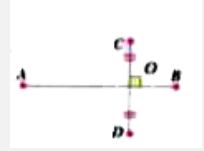In a quadrilateral ABCD, AB= AD and CB= CD. Prove that:
AC is perpendicular bisector of BD
Step by step video & image solution for In a quadrilateral ABCD, AB= AD and CB= CD. Prove that: AC is perpendicular bisector of BD by Maths experts to help you in doubts & scoring excellent marks in Class 9 exams.
Updated on:21/07/2023Topper's Solved these Questions
- QUADRILATERALSBOOK - NAGEEN PRAKASHAN ENGLISHCHAPTER - QUADRILATERALSEXERCISE - Revision Exercise (long Answer Questions)
5 Videos
- QUADRILATERALSBOOK - NAGEEN PRAKASHAN ENGLISHCHAPTER - QUADRILATERALSEXERCISE - Revision Exercise (very Short Answer Questions)
10 Videos
- PROBABILITYBOOK - NAGEEN PRAKASHAN ENGLISHCHAPTER - PROBABILITYEXERCISE - Revision Exercise (very Short Answer /short Answer Questions)
10 Videos
- STATISTICSBOOK - NAGEEN PRAKASHAN ENGLISHCHAPTER - STATISTICSEXERCISE - Revision Exercise
12 Videos
Similar Questions
In a quadrilateral ABCD, AB= AD and CB= CD. Prove that:
AC bisects angle BAD
View SolutionIn a quadrilateral ABCD, AB = AD and CB = CD. Prove that :
(i) AC bisects angle BAD
(ii) AC is perpendicular bisector of BD.
View SolutionIf ABCD is a quadrilateral such that AB = AD and CB = CD , then prove that AC is the perpendicular bisector of BD.
View SolutionIn a quadrilateral ABCD, AB = CD and ∠B=∠C. Prove that
AC=AB
View SolutionIn a quadrilateral ABCD, AB = CD and ∠B=∠C. Prove that
AD is parallel to BC.
View SolutionIn quadrilateral ABCD, AB=DC and AD=BC. Prove that the sides AB and DC are parallel to each other.
View SolutionIn the quadrilateral ABCD, the diagonals AC and BD are equal and perpendicular to each other. What type of a quadrilateral is ABCD?
View SolutionABCD is a parallelogram. What kind of quadrilateral is it if:
(i) AC=CD and AC is perpendicular to BD?
(ii) AC is perpendicular to BD but is not equal to it ?
(iii) AC=BD but AC is not perpendicular to BD ?
View SolutionIn the following figure is CD the perpendicular bisector of AB ?

View SolutionDraw a parallelogram ABCD, with AB=6cm, AD=4.8 cm and ∠DAB=45∘.
Draw the perpendicular bisector of side AD and let it meet AD at point P. also, draw the diagonals AC and BD, and let them intersect at point O. join O and P. measure OP. DC=5 cm
View Solution
